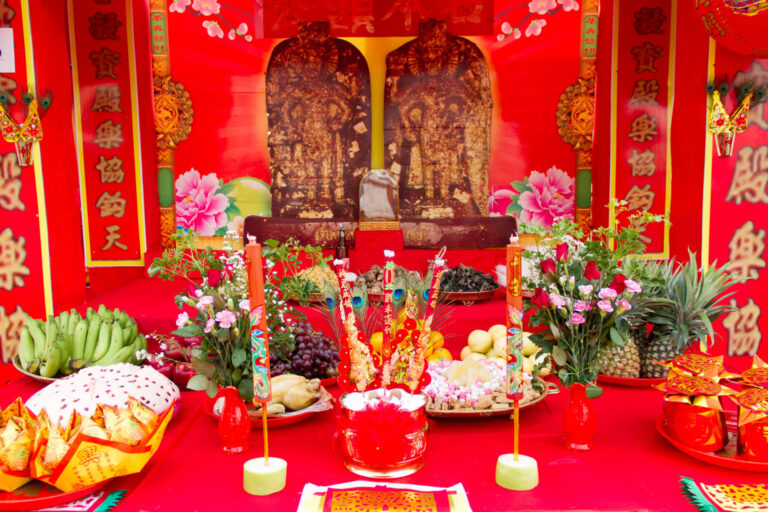Imbued with unseen wisdom, the selection of fruits for offerings in religious practices reveals a profound understanding of their symbolic significance.
In traditional Chinese ceremonies, the use of fruit offerings plays a critical role, particularly on the first and fifteenth days of the lunar month and during significant festivals.
While the nutritional value of each fruit is considered, the choice extends beyond mere sustenance. Each fruit’s symbolic meaning has a profound impact on its suitability for different ceremonies, reinforcing the intricate nature of selecting fruit offerings.
This process of selecting appropriate fruit offerings is not based on personal preference; rather, it’s deeply connected to the symbolic resonance of each fruit.
For instance, bananas, associated with ‘summoning’, are not considered suitable fruit offerings during the Hungry Ghost Festival due to their implied power to ‘summon’ wandering spirits.
In contrast, the Hokkien tradition prescribes the offering of ‘five fruits and six vegetarian dishes‘ when honouring the Heavenly God, demonstrating the diverse interpretations within the practice of fruit offerings.
Interestingly, the pineapple, a popular choice for numerous ceremonies, symbolizes ‘prosperity is coming’ in the Fujian dialect.
In the following sections, let’s explore further the hidden meanings and therapeutic benefits of fruits commonly used as offerings in these acts of divine worship.
Table of Contents
Suitable Fruits for Worship:
1. Pineapple (Symbolizes prosperity) – 鳳梨
This sweet and slightly sour fruit nourishes the stomach and kidney meridians and can quench thirst, relieve irritation, reduce swelling, and invigorate qi. However, pineapples should be avoided during the Qingming Festival and Hungry Ghost Festival to prevent ‘summoning’ unwanted ‘guests’.
2. Pear (Symbolizes water brings wealth) – 水梨
A pear, with its cooling properties, can clear heat and moisten the lungs. It’s a popular choice for its wealth-bringing symbolism, but people with a cold spleen and stomach should consume it in moderation.
3. Tangerine (Symbolizes auspicious) – 橘子
This fruit, apart from stimulating appetite and moistening lungs, can treat nausea and excessive alcohol consumption. The dried tangerine peel is particularly beneficial for the liver, spleen, and lungs’ qi flow.
4. Persimmon (Symbolizes fulfilled wishes) – 柿子
Persimmon’s sweet and cooling properties are excellent for treating heat-induced coughs, but it’s unsuitable for those with cold spleen and kidney.
5. Pomelo (Symbolizes fertility) – 柚子
Pomelo strengthens the stomach and promotes physical beauty. However, due to its cooling nature, it is not recommended for those with a cold spleen and stomach.
6. Apple (Symbolizes peace and safety) – 苹果
A nourishing fruit for the spleen and lung meridians, an apple is a symbol of peace and safety. However, its consumption should be controlled to prevent bodily weakness.
7. Grape (Symbolizes abundant progeny) – 葡萄
A powerful qi and blood replenisher, the grape symbolizes a flourishing lineage. It also benefits the liver and kidneys and strengthens muscles and bones.
8. Cantaloupe/Rock Melon (Symbolizes lineage longevity) – 香瓜
This sweet and slightly cool fruit relieves hunger and clears lung heat. However, overconsumption can cause diarrhea.
9. Oranges (Symbolizes luck and prosperity) – 橙子/柳丁
Oranges are believed to stimulate appetite, help digestion, and suppress coughs, making them an emblem of great luck and prosperity.
10. Banana (Symbolizing the attraction of good fortune) – 香蕉
In the taiwanese dialect, the term for banana carries a homophonic implication of “summoning”, symbolizing the attraction of good fortune. However, it should be avoided during the Qingming and Zhongyuan festivals (Hungry Ghost Festival).
Additionally, remember that according to the ‘I Ching Book of Changes (易经)’, odd numbers are yang and even numbers are yin. Therefore, the number and type of fruits used for worship should be odd, like three or five.
Whether it’s for a festival or regular worship, it’s important to understand these rules about offerings to avoid mistakes and embarrassment!

Types of Fruit Not To Be Used in Worship
However, not all fruits are suitable for offerings. Certain fruits carry negative connotations and should be avoided during worship:
- Plums – 李子, symbolizing separation,
- Watermelons – 西瓜, used for summoning souls,
- Citron (Buddha’s Hand) – 释迦, due to its resemblance to Buddha,
- Guava – 芭乐, seen as disrespectful due to its seeds,
- Tomato – 番茄, for similar reasons as guava,
- Starfruit – 杨桃, implying hardship, in Taiwanese, this sounds like “distracted thoughts (台语“杂念”).
- Lemon – 柠檬, for its sour taste,
- Wax Apple – 莲雾, symbolizing loss of wealth. Also, since it is hollow, offering it to deities may be seen as insincere and hypocritical.
Fruits to Avoid During the Qingming and Hungry Ghost Festivals
- Banana: In Taiwanese, it symbolizes “summoning”.
- Pear: It implies the meaning of “coming”.
- Pineapple: It suggests the concept of “prosperity arriving”.
- Combining banana, plum, pear, and pineapple in offerings is not appropriate. Together, these four fruits symbolize “inviting your prosperity”, which implies the idea of inviting others to join. It’s recommended to avoid these during the Qingming and Hungry Ghost Festivals.
- Lychee, Longan, Grapes, and other cluster fruits are also inappropriate for offerings because they symbolize a group reporting together.
The Symphony of Fruits in Worship
Understanding the intricate procedures to welcome the god of wealth and the underlying symbolism in fruit offerings enriches our rituals and strengthens our connection with divine energies.
It underscores the fact that our actions, beliefs, and success mindset interweave into a harmonious symphony, echoing the rich heritage and deep wisdom of our ancestors.
As we offer fruits symbolizing wealth, good health, and success, we also internalize these values, bringing prosperity and wellbeing into our lives.
This subtle interplay of external rituals and internal transformations shapes our destiny, embodying the essence of numerology and fortune telling.
Isn’t it fascinating how rituals and practices contain layers of meaning beyond what meets the eye? How do you interpret these symbols and incorporate them into your own life’s rituals?
Can dried fruits be used for worship?
Yes, dried fruits can be used for fruit offerings, as they are merely another preservation form of ripe, unspoiled fruits.
Can dried mangoes and dragon fruits be used for worship?
Yes, there are no specific taboos against mangoes or dragon fruit in worship practices. They can be used, and their dried versions can be a convenient choice if one worries about fresh fruits spoiling.
Are there specific fruits used for different festivals in Chinese worship?
Yes, the selection of fruits often varies with the season and the specific festival. However, the underlying principle is the symbolic meaning each fruit carries in relation to the festival’s nature.
What fruits are suitable for offerings in Chinese worship?
Fruits such as pineapple, pear, tangerine, persimmon, pomelo, apple, grape, cantaloupe, and oranges are considered suitable for offerings due to their auspicious symbolic meanings.
Why are some fruits unsuitable for worship in Chinese traditions?
Certain fruits, like plums, watermelon, Buddha’s Hand, guava, tomato, starfruit, lemon, and wax apple, are considered inappropriate due to their negative symbolic implications, such as summoning souls, inducing hardship, or disrespect to the deities.
What’s the significance of the number of fruits offered in Chinese worship?
According to the ‘I Ching Book of Changes’, odd numbers represent yang, and even numbers represent yin. Thus, the number of fruits offered should typically be odd, such as three or five.
Can I eat the fruits after prayers?
Yes, it is generally acceptable to consume the fruits after they have been offered in prayers. However, they must be properly washed before consumption to ensure cleanliness and safety. It’s also important to note that the consumption of these fruits is seen as partaking in the blessings of the gods.
Can mango be used for fruit offerings to the gods?
Yes, mangoes can be used as fruit offerings to the gods. There’s no known prohibition against them in traditional practices. Always ensure they’re fresh, ripe, and respectfully presented.
Can mangosteen be used for fruit offerings to the gods?
Absolutely, mangosteens are acceptable for fruit offerings. They’re often seen as a symbol of good fortune and abundance. However, as with any offering, ensure the mangosteens are fresh and offered with reverence.
Can rambutans be used for fruit offerings to the gods?
Yes, rambutans can be offered to the gods. While not as commonly used as other fruits, there’s no specific prohibition against them. As always, it’s crucial that the rambutans are fresh and ripe, and presented in a respectful manner.



